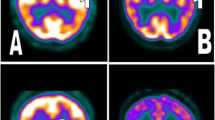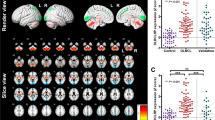Abstract
Objective
Chemobrain is a recently proposed pathological entity. 18F-FDG PET/CT can show objective abnormalities to explain brain disorders caused by chemotherapy, although no study has investigated these phenomena in children to date. The main objective of the present study was to examine quantitatively the effects of chemotherapy on brain metabolism in a homogeneous population of children treated for Hodgkin's lymphoma using 18F-FDG PET/CT.
Methods
In this retrospective study, we included 20 children, newly diagnosed with Hodgkin’s lymphoma, who underwent 18F-FDG PET/CT at initial staging and at least one PET/CT in follow-up. The SPM12 software provided t-maps to show the difference in metabolism between these PET/CTs. The statistical maps were analyzed with xjView software to identify the brain regions associated with the clusters detected.
Results
Altered glucose metabolism was found in the frontal, cingular, and temporoinsular regions after two cycles of chemotherapy. Results in children were compared to a group of 35 adults. For the same statistical threshold, the extent and depth of the metabolic alterations were less in the adult group than in children.
Conclusions
18F-FDG PET/CT is useful in providing objective data to explain brain disorders caused by chemotherapy. This could lead to better care and should be compared to neuropsychological test results.

Similar content being viewed by others
Abbreviations
- PET:
-
Positon emission tomography
- CT:
-
Computed tomography
- FDG:
-
Fluorodesoxyglucose
- IQ:
-
Intelligence quotient
- OEPA:
-
Vincristine, etoposide, prednisone and doxorubicin
- ABVD:
-
Doxorubicin, bleomycin, vinblastine and dacarbazine
- BEACOPP:
-
Bleomycin, etoposide, doxorubicin, cyclophosphamide, vincristine, procarbazine and prednisone
- OSEM:
-
Ordered-subsets expectation maximization
- MNI:
-
Montreal Neurological Institute
- FWHM:
-
Full width at half maximum
- FWE:
-
Family-wise error
References
Hodgson KD, Hutchinson AD, Wilson CJ, Nettelbeck T. A meta-analysis of the effects of chemotherapy on cognition in patients with cancer. Cancer Treat Rev. 2013;39:297–304.
Wefel JS, Lenzi R, Theriault R, Buzdar AU, Cruickshank S, Meyers CA. “Chemobrain” in breast carcinoma?: a prologue. Cancer. 2004;101:466–75.
Ponto LLB, Menda Y, Magnotta VA, Yamada TH, Denburg NL, Schultz SK. Frontal hypometabolism in elderly breast cancer survivors determined by [(18)F]fluorodeoxyglucose (FDG) positron emission tomography (PET): a pilot study. Int J Geriatr Psychiatry. 2015;30:587–94.
Silverman DHS, Dy CJ, Castellon SA, Lai J, Pio BS, Abraham L, et al. Altered frontocortical, cerebellar, and basal ganglia activity in adjuvant-treated breast cancer survivors 5–10 years after chemotherapy. Breast Cancer Res Treat. 2007;103:303–11.
Goldfarb L, Hubele F, Noblet V, Fornecker L-M, Namer IJ. Étude préliminaire sur les effets de la chimiothérapie sur le métabolisme cérébral des patients traités pour un lymphome de Hodgkin. Médecine Nucléaire. 2017;41:93–8.
Chiaravalloti A, Pagani M, Di Pietro B, Danieli R, Tavolozza M, Travascio L, et al. Is cerebral glucose metabolism affected by chemotherapy in patients with Hodgkin’s lymphoma? Nucl Med Commun. 2013;34:57–63.
Sorokin J, Saboury B, Ahn JA, Moghbel M, Basu S, Alavi A. Adverse functional effects of chemotherapy on whole-brain metabolism: a PET/CT quantitative analysis of FDG metabolic pattern of the “chemo-brain”. Clin Nucl Med. 2014;39:e35–9.
Baudino B, Dagata F, Caroppo P, Castellano G, Cauda S, Manfredi M, et al. The chemotherapy long-term effect on cognitive functions and brain metabolism in lymphoma patients. Q J Nucl Med Mol Imaging. 2012;56:559–68.
Moore HCF. An overview of chemotherapy-related cognitive dysfunction, or “chemobrain”. Oncology (Williston Park, NY). 2014;28:797–804.
Jean-Pierre P, McDonald BC. Neuroepidemiology of cancer and treatment-related neurocognitive dysfunction in adult-onset cancer patients and survivors. Handb Clin Neurol. 2016;138:297–309.
Holmes D. Trying to unravel the mysteries of chemobrain. Lancet Neurol. 2013;12:533–4.
Chiaravalloti A, Pagani M, Cantonetti M, Pietro DI, Tavolozza M, Travascio L, et al. Brain metabolic changes in Hodgkin disease patients following diagnosis and during the disease course: an 18F-FDG PET/CT study. Oncol Lett. 2015;9:685–90.
Robison LL, Green DM, Hudson M, Meadows AT, Mertens AC, Packer RJ, et al. Long-term outcomes of adult survivors of childhood cancer. Cancer. 2005;104:2557–644.
Landier W, Armenian S, Bhatia S. Late effects of childhood cancer and its treatment. Pediatr Clin North Am. 2015;62:275–300.
Simó M, Rifà-Ros X, Rodriguez-Fornells A, Bruna J. Chemobrain: a systematic review of structural and functional neuroimaging studies. Neurosci Biobehav Rev. 2013;37:1311–21.
Stauss J, Franzius C, Pfluger T, Juergens KU, Biassoni L, Begent J, et al. Guidelines for 18F-FDG PET and PET-CT imaging in paediatric oncology. Eur J Nucl Med Mol Imaging. 2008;35:1581–8.
Kluge R, Kurch L, Georgi T, Metzger M. Current role of FDG-PET in pediatric Hodgkin’s lymphoma. Semin Nucl Med. 2017;47:242–57.
Dietrich J, Monje M, Wefel J, Meyers C. Clinical patterns and biological correlates of cognitive dysfunction associated with cancer therapy. Oncologist. 2008;13:1285–95.
Ek CJ, Dziegielewska KM, Habgood MD, Saunders NR. Barriers in the developing brain and neurotoxicology. Neurotoxicology. 2012;33:586–604.
Saunders NR, Liddelow SA, Dziegielewska KM. Barrier mechanisms in the developing brain. Front Pharmacol. 2012;3:46.
Konsman JP, Vigues S, Mackerlova L, Bristow A, Blomqvist A. Rat brain vascular distribution of interleukin-1 type-1 receptor immunoreactivity: relationship to patterns of inducible cyclooxygenase expression by peripheral inflammatory stimuli. J Comp Neurol. 2004;472:113–29.
Wang X-M, Walitt B, Saligan L, Tiwari AFY, Cheung CW, Zhang Z-J. Chemobrain: a critical review and causal hypothesis of link between cytokines and epigenetic reprogramming associated with chemotherapy. Cytokine. 2015;72:86–96.
Raffa RB. A proposed mechanism for chemotherapy-related cognitive impairment ('chemo-fog’). J Clin Pharm Ther. 2011;36:257–9.
Tangpong J, Cole MP, Sultana R, Estus S, Vore M, St Clair W, et al. Adriamycin-mediated nitration of manganese superoxide dismutase in the central nervous system: insight into the mechanism of chemobrain. J Neurochem. 2007;100:191–201.
Joshi G, Aluise CD, Cole MP, Sultana R, Pierce WM, Vore M, et al. Alterations in brain antioxidant enzymes and redox proteomic identification of oxidized brain proteins induced by the anti-cancer drug adriamycin: implications for oxidative stress-mediated chemobrain. Neuroscience. 2010;166:796–807.
Christie L-A, Acharya MM, Parihar VK, Nguyen A, Martirosian V, Limoli CL. Impaired cognitive function and hippocampal neurogenesis following cancer chemotherapy. Clin Cancer Res. 2012;18:1954–65.
Liedke PER, Reolon GK, Kilpp B, Brunetto AL, Roesler R, Schwartsmann G. Systemic administration of doxorubicin impairs aversively motivated memory in rats. Pharmacol Biochem Behav. 2009;94:239–43.
Kaplan SV, Limbocker RA, Gehringer RC, Divis JL, Osterhaus GL, Newby MD, et al. Impaired brain dopamine and serotonin release and uptake in wistar rats following treatment with carboplatin. ACS Chem Neurosci. 2016;7:689–99.
Minisini A, Atalay G, Bottomley A, Puglisi F, Piccart M, Biganzoli L. What is the effect of systemic anticancer treatment on cognitive function? Lancet Oncol. 2004;5:273–82.
Shilling V, Jenkins V, Fallowfield L, Howell T. The effects of hormone therapy on cognition in breast cancer. J Steroid Biochem Mol Biol. 2003;86:405–12.
Wilner AP, de Varennes B, Gregoire PA, Lupien S, Pruessner JC. Glucocorticoids and hippocampal atrophy after heart transplantation. Ann Thorac Surg. 2002;73:1965–7.
Höschl C, Hajek T. Hippocampal damage mediated by corticosteroids—a neuropsychiatric research challenge. Eur Arch Psychiatry Clin Neurosci. 2001;251(Suppl 2):II81–8.
Author information
Authors and Affiliations
Corresponding author
Additional information
Publisher's Note
Springer Nature remains neutral with regard to jurisdictional claims in published maps and institutional affiliations.
Rights and permissions
About this article
Cite this article
Tauty, A., Noblet, V., Paillard, C. et al. Evaluation of the effects of chemotherapy on brain glucose metabolism in children with Hodgkin’s lymphoma. Ann Nucl Med 33, 564–569 (2019). https://doi.org/10.1007/s12149-019-01363-8
Received:
Accepted:
Published:
Issue Date:
DOI: https://doi.org/10.1007/s12149-019-01363-8




